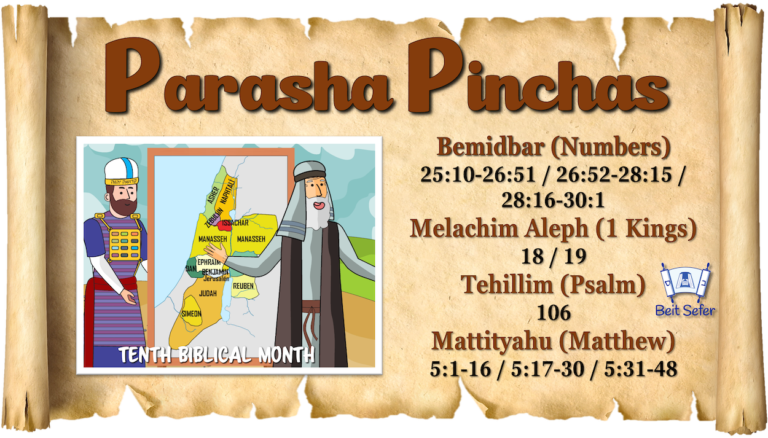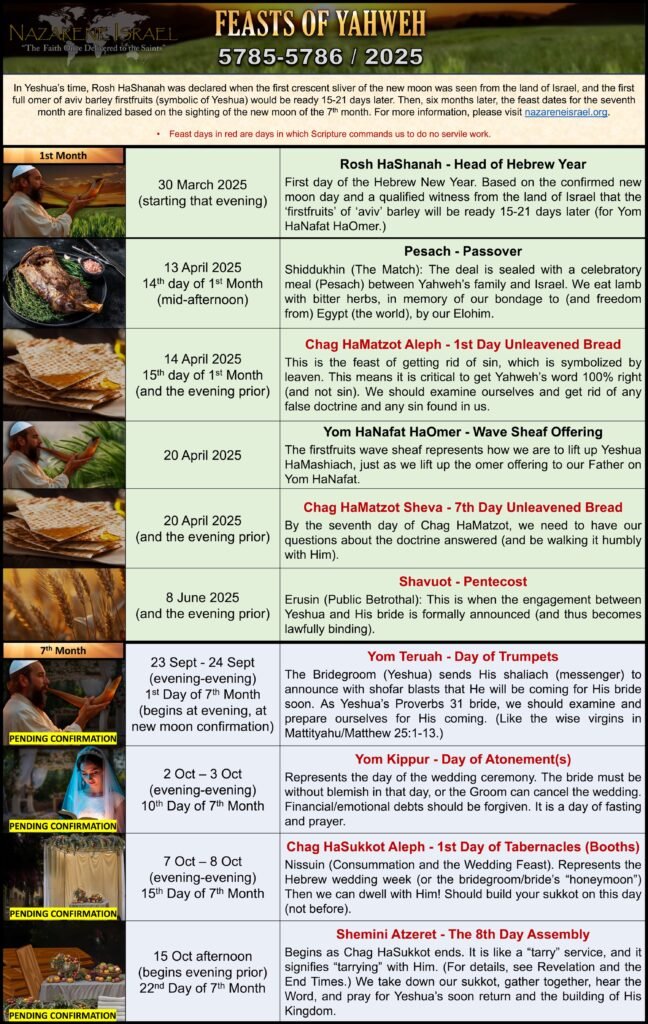Parasha Pinchas – Year 2 – The Fulfillment of the Promise.
Shabbat Shalom, Nazarene family.
This week we will study the parasha Pinchas, portion of year 2, where we will learn about how Yahweh divided the Promised Land among the tribes of Israel, assigning a portion to each tribe. We will also see the instructions about sacrifices and offerings that the people were to present to Yahweh on various occasions, such as festivals and celebrations. Finally, we will understand the importance of obedience to Yahweh’s instructions, the unity of the people of Israel, and how they were to worship and honour Yahweh through special acts.
Bemidbar (Numbers) 26:52-54
52 Then Yahweh spoke to Moshe [Moses], saying:
53 “To these the land shall be divided as an inheritance, according to the number of names.
54 To a large tribe you shall give a larger inheritance, and to a small tribe you shall give a smaller inheritance. Each shall be given its inheritance according to those who were numbered of them.
This week corresponds to the reading of the texts (in bold):
- Bemidbar (Numbers) 25:10-26:51 / 26:52-28:15 / 28:16-30:1
- Melachim Aleph (1 Kings) 18/19
- Tehillim (Psalm) 106
- Mattityahu (Matthew) 5:1-16 / 5:17-30 / 5:31-48
Summary of the weekly study, Year two:
Bemidbar (Numbers) 26:52-28:15
In these passages, Yahweh instructs Moshe (Moses) on how to divide the Promised Land among the tribes of Israel, allocating the inheritance according to the size of each tribe, but always under Yahweh’s direction. In addition, the laws concerning daily offerings, Sabbath sacrifices and monthly offerings are detailed. These instructions show how the people were to honour Yahweh constantly, remembering His provision and holiness. The central teaching speaks of the importance of obedience, gratitude and sincere worship, recognising Yahweh as the one who guides and provides for His people.
Melachim Aleph (1 Kings) 19
In these verses, Eliyahu (Elijah), discouraged after facing Jezebel’s opposition, flees into the desert and wishes to die. Yahweh, in His mercy, sends him food and strengthens him for a 40-day journey to Mount Horeb. There, Elijah experiences Yahweh’s presence not in powerful phenomena such as wind, earthquake or fire, but in a gentle whisper, showing that Yahweh works in unexpected ways. Yahweh encourages Eliyahu, gives him new instructions and assures him that he is not alone, for there is a faithful remnant. This chapter teaches us about Yahweh’s faithfulness and the importance of trusting in Him.
Mattityahu (Matthew) 5:17-30
In these verses, Yeshua teaches that he did not come to abolish the Torah or the prophets, but to fulfil them, stressing the importance of obeying the commandments. He explains that the righteousness of his followers must surpass that of the Pharisees to enter the Kingdom of Heaven. Yeshua expands the understanding of the Torah, showing that sin is not only found in outward actions, such as murder or adultery, but also in the intentions of the heart, such as anger and impure desire. This teaching shows us the need for inner purity and the need to live by a higher standard of righteousness.
–
Enjoy this fun activity with the whole family. Inside you will find development questions for the three weekly sections (Torah, Haftarah and Brit Chadashah). While the older ones discuss the questions and their answers, the younger ones can color the picture related to the teaching, solve a maze, find the 7 differences and much more. We encourage you to do it week by week and instill in your children the habit of studying Yahweh’s word as a family.
We hope you and especially your sons and daughters enjoy this effort. For it is through the study of the Scriptures that we can come to understand the love and care that Yahweh has always had for us. And also to perceive that He has been taking care of even the smallest detail, so that we can take care and enjoy all that He gives us. That is why it is so important that our children learn and grow up knowing that they are loved by the Creator of all that exists.
Shalom.
To view the Tanach studies, click here
To view the Brit Chadasha studies, click here




